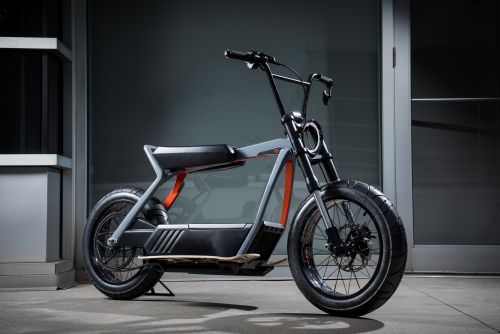WASHINGTON (BRAIN) — More than a week after the Trump administration announced some tariff exclusions in the Federal Register, the industry is still unclear — or even "doubtful" — if e-bikes earned the exclusion, which would mean millions of dollars of refunded tariffs for importers.
Meanwhile, exclusion requests are pouring in to the U.S. Trade Representative as importers and trade organizations hope to duplicate the success of State Bicycle, which requested an exclusion for single speed road bikes and was granted it, to the benefit of all importers of that type of bicycle.
When State Bicycle learned of its success on Sept. 20 just four other companies had filed requests for exclusions for bike-related products since the filing window opened in July. But by Monday, when the filing window closed, the USTR had received 94 exclusion requests for bike products from companies including Bell Sports, Santa Cruz, CatEye, J&B, Delta, Parlee, QBP, Kent, Trek, Huffy, and Burley, as well as PeopleForBikes and the Retail Industry Leaders Association.
The USTR has yet to grant or deny any of the requests except State Bicycles'. However, the requests from Delta, Parlee and Boaz Audio have advanced from "Stage 1" status to "Stage 2." There are four stages before a request is granted or denied.
As for the e-bike exclusion, there are several reasons why experts like PeopleForBikes' Alex Logemann are urging caution.
"We are doubtful that this exclusion was intended by the U.S. Trade Representative to apply to e-bikes." — PeopleForBikes
The USTR announced that the exclusion applies to two Harmonized Tariff Schedule codes, both enacted in July to replace a single prior HTS code for motorcycles and other cycles with an electric motor for propulsion. E-bikes, as well as electric motorcycles, fall under these codes, with one code for motors 250 watts and below and the other for motors 251-1000 watts.
The USTR appears to be granting exclusions to narrow product categories, as demonstrated by the singlespeed exclusion, for example. The exclusion was granted to singlespeed road bikes even though there is not a specific HTS code for that type of bike. The bikes fall under the same code as other adult road bikes and hybrids with relatively narrow tires. So the language of the exclusion might need to be considered carefully.
The language in the Federal Register earlier this month said the exclusion applied to "Motorcycles with electric power for propulsion, of a power not exceeding 1,000 W (described in statistical reporting numbers 8711.60.0050 or 8711.60.0090)."
 Also of note, the USTR granted an exclusion to an importer of electric motorcycles, while several e-bike importers and PeopleForBikes requested exclusion for e-bikes — under the same HTS code — and were denied.
Also of note, the USTR granted an exclusion to an importer of electric motorcycles, while several e-bike importers and PeopleForBikes requested exclusion for e-bikes — under the same HTS code — and were denied.
On Monday PeopleForBikes released a statement that is more skeptical than its previous stance.
"All companies should always seek their own legal counsel for advice on how U.S. Customs law applies to their products," the group said.
"PeopleforBikes cannot and does not provide legal advice. With respect to the recent exclusions specifically granted to electric motorcycles and skateboards, in light of the previous denial of requests for exclusion of e-bikes and the language of the exclusion itself, we are doubtful that this exclusion was intended by the U.S. Trade Representative to apply to e-bikes. However, companies may seek clarification for their specific products directly from Customs if they wish and if so advised by their counsel. We would appreciate notification if your company chooses to request such a ruling from Customs."
The newer requests for exclusion are narrow. For example, PeopleForBikes asked for exclusion for various bike sizes, inner tubes, frames, rims and forks. QBP asked for exclusions for various Salsa bike models. Bell asked for exclusions for saddles, helmet fitting systems, inner tubes and air pumps.
In Trek's requests for exclusion (including this one for children's bikes) for various bike categories, the company noted that it had reviewed State Bicycle's successful request and said "the same is true for Trek's sourcing."
Besides the ability to import e-bikes without paying the extra 25% tariff, the exclusions are retroactive. Importers of excluded products are due repayment of the tariffs they've paid since it was imposed, which was August 2018 in the case of e-bikes.
Pedego, for example, would recover over $300,000 in paid tariffs. Even though the company shifted its production to Vietnam last fall, it still imported from China during a transition period.
"We're in waiting right now along with the rest of the industry to see how the exclusion plays out." — Rad Power CEO Mike Radenbaugh
Pedego's founder, Don DiConstanzo, told BRAIN earlier this month that he was not certain he'd ever get the money.
"Our interpretation is that we are eligible, but I'm not holding my breath," said DiCostanzo.
Companies that continued production in China, such as Rad Power Bikes, could recover much more than Pedego.
Mike Radenbaugh, Rad Power's CEO, told BRAIN, "We're in waiting right now along with the rest of the industry to see how the exclusion plays out."




